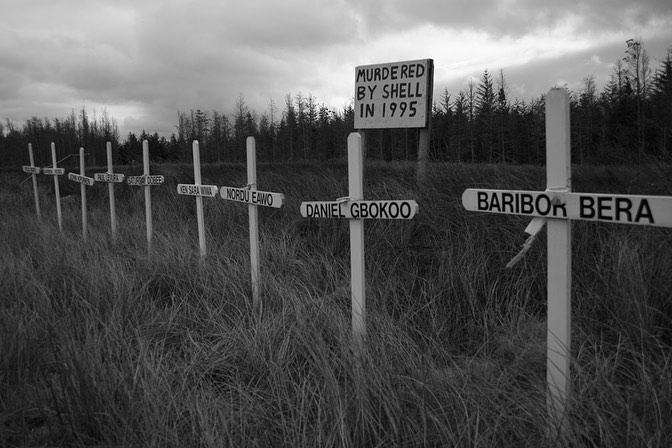#Ogoni9 #ShellGuilty #NigerianLivesMatter #KenSaroWiwa #JusticeForOgoniland
Today we will tell you the story of #Ogoniland and the #Ogoni9 activists. A story in 9 chapters, commemorating the 9 activists that were brutally murdered for their struggle for justice. Shell plays a main role in this tragedy and the struggle continues until today. Stay tuned.
Chapter 1
In 1956, an oil field was found in the Niger Delta where the Indigenous Ogoni People live. Under false promises of financial benefits and ‘no harm done’, Shell started the exploitation of the oil field two years later, causing extreme pollution in the area: between 1958 and 1990, 80% of the farmlands and waterways in Ogoniland were polluted by oil spills.
The Ogoni, who depend on their land, were no longer able to sustain themselves. Despite the fact that oil production in Ogoni was yielding so much profit (it was recorded that more than £30 billion worth of oil was extracted from this region!); the Ogoni people saw little or no benefit from the Royal Dutch Shell Petroleum Company and thus, it was only a matter of time before trouble started to brew.
R.I.P Nordu Eawo
Chapter 2
The uprising of the Ogoni people starts in 1990, when writer and activist Ken Saro-Wiwa, appalled by the situation of the Ogoni, starts the Movement for the Survival of the Ogoni People (MOSOP). MOSOP is able to organise huge peaceful protest marches. The biggest one attracted 300,000 people in 1993, out of a total population of 500,000 Ogoni people.
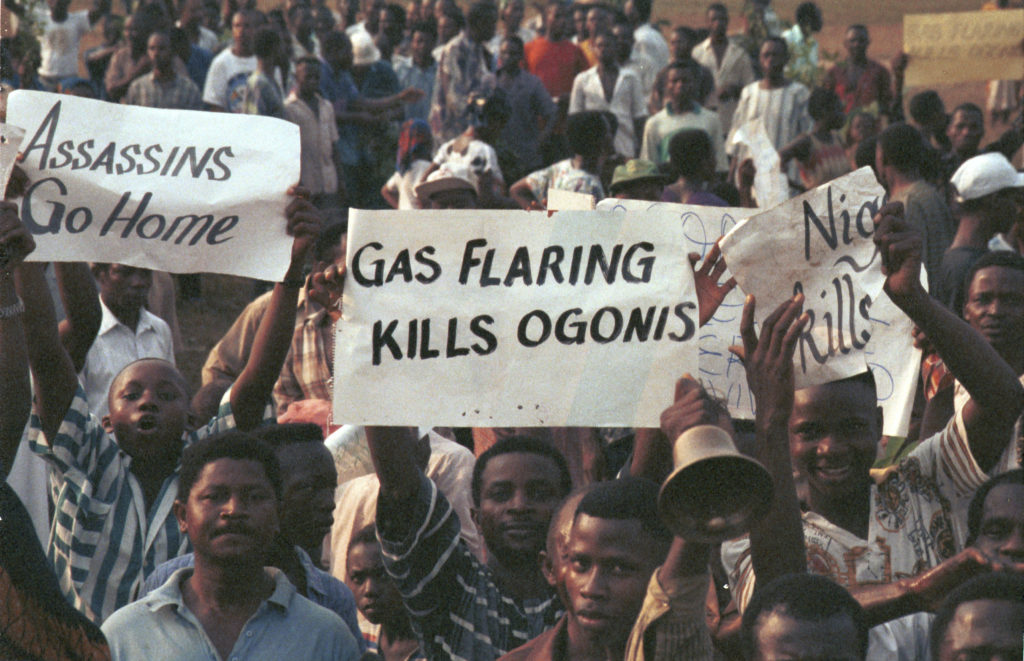
R.I.P Daniel Gbooke
Chapter 3
Shell is not amused with the ongoing protests that led to a complete stop of their operations in Ogoniland. However, instead of listening to the demands of the people, Brian Anderson, the director of Shell Nigeria, has a meeting with Nigerian president Sani Abacha in 1994. “”I raised the problem of the Ogonis and Ken Saro-Wiwa, and explained that Shell has not been active in that area for almost a year,” Anderson wrote in his notes of the meeting. Anderson reported that he left the meeting with the sense that Abacha would “intervene with help of either the military or the police.”
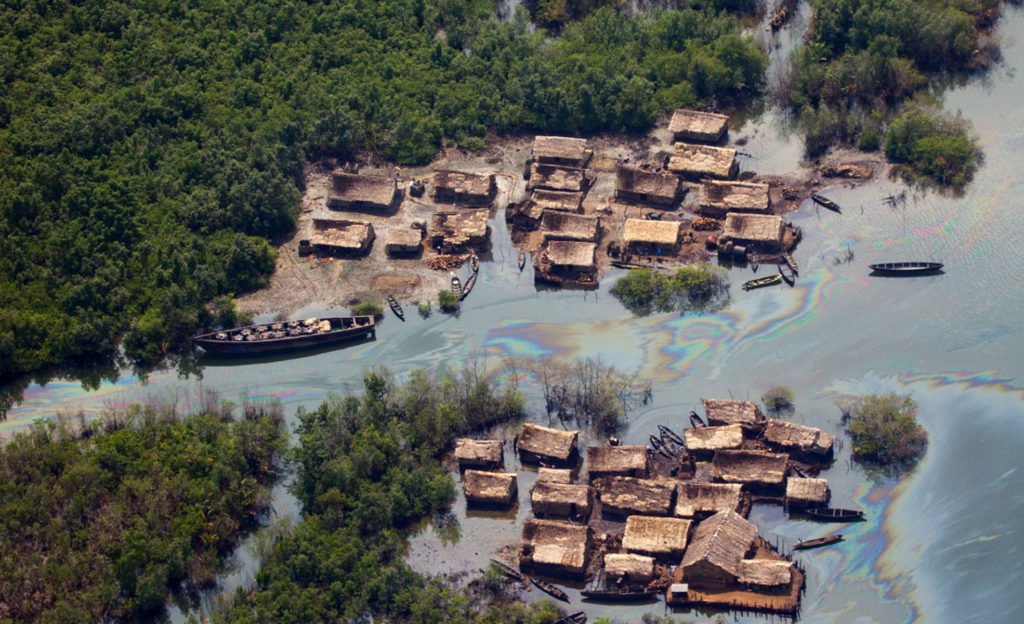
R.I.P Paul Levula
Chapter 4
One month after the meeting between Anderson and Abacha, 15 men, including Ken Saro-Wiwa, are arrested and tortured for the murder of four Ogoni chiefs. There is no evidence that the men were involved in these murders and the arrests are widely regarded as a set-up to silence the arrested men. Also, Esther Kiobel, the wife of Barinem Kiobel (one of the arrested men) is locked up for two weeks and abused during her imprisonment. At the same time, the Nigerian regime sends the military to the Ogoni region to stop the protests. Villages are attacked and more than 4,000 people are killed.
R.I.P Baribor Bera
Chapter 5
On the 30th of October 1995, 9 of the 15 men receive a death sentence in court. On the 10th of November all 9 men are hanged.
In court, Ken Saro-Wiwa holds an impressive speech, which starts as follows:
“My lord,
We all stand before history. I am a man of peace, of ideas. Appalled by the denigrating poverty of my people who live on a richly endowed land, distressed by their political marginalization and economic strangulation, angered by the devastation of their land, their ultimate heritage, anxious to preserve their right to life and to a decent living, and determined to usher to this country as a whole a fair and just democratic system which protects everyone and every ethnic group and gives us all a valid claim to human civilization, I have devoted my intellectual and material resources, my very life, to a cause in which I have total belief and from which I cannot be blackmailed or intimidated. I have no doubt at all about the ultimate success of my cause, no matter the trials and tribulations which I and those who believe with me may encounter on our journey. Nor imprisonment nor death can stop our ultimate victory.”
R.I.P Saturday Dobee
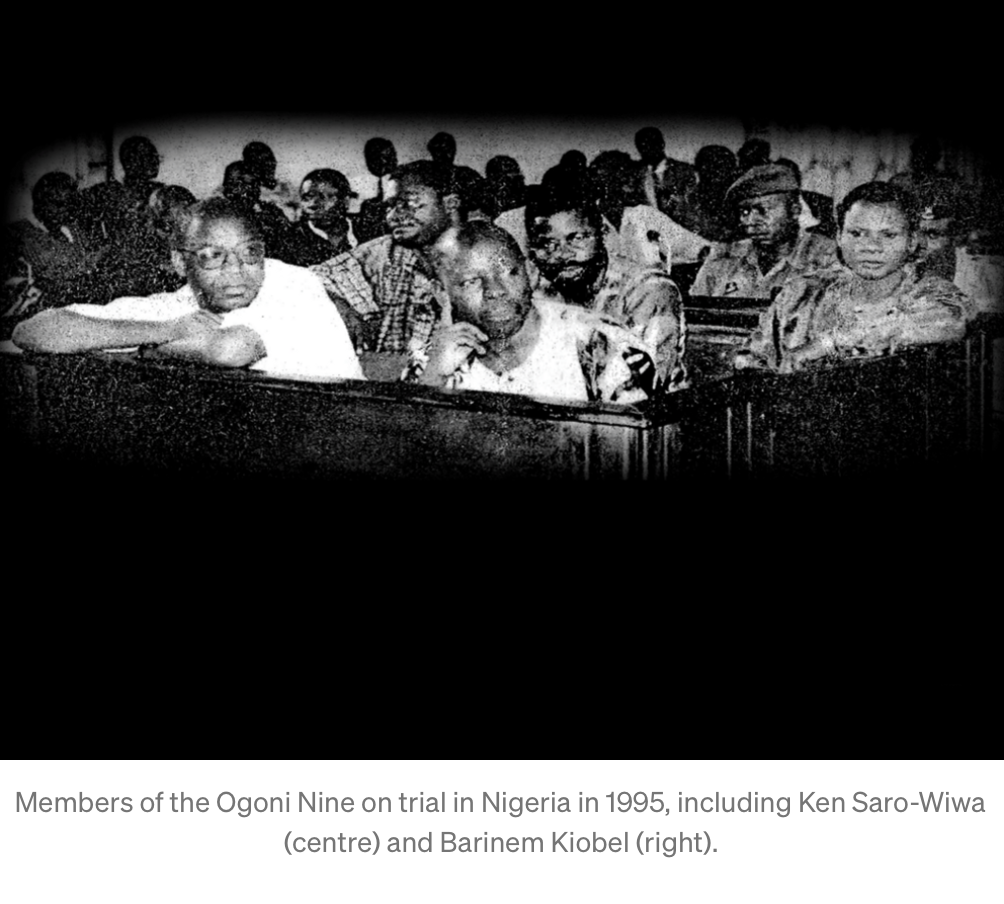
Chapter 6
In 1996, the Center for Constitutional Rights (CCR) sued Shell for its complicity in human rights violations against the Ogoni people, including colluding with the Nigerian government to bring about the arrests and execution of the Ogoni 9. In June 2009, on the eve of the trial, the parties agreed to a settlement providing a total cost of $15.5 million to compensate the plaintiffs, establish a trust for the benefit of the Ogoni people, and cover some of the legal costs and fees associated with the case. In other words, Shell paid $15.5 million to avoid a courtcase and a conviction. Four widows, Esther Kiobel, Victoria Bera, Blessing Eawo and Charity Levula who weren’t party in the settlement are still fighting Shell in The Court in The Hague.
https://www.theguardian.com/world/2009/jun/08/nigeria-usa
R.I.P Felix Nuate
Chapter 7
In 2006, the Nigerian government invited the United Nations Environmental Programme (UNEP), to conduct a study on the pollution of Ogoniland. The study found that 50 years of oil exploration activities by Shell had caused a very high level of environmental degradation because of oil spills, oil flaring, and waste discharge. It also found that the water was contaminated 900 times beyond acceptable limit of chemicals (benzene) that can cause cancer. UNEP established that it would take between 25-30 years to rehabilitate Ogoniland and that it would require one billion dollars to begin the exercise.
14 years later, in 2020, Ogoniland has still not been cleaned up.
https://www.amnesty.org.uk/press-releases/nigeria-shell-still-failing-clean-pollution-niger-delta
Even worse, oil spills are still happening in the area, and Shell continues to use all legal means to avoid paying compensation. https://www.foei.org/news/oil-spills-ogoniland-nigeria-shell
R.I.P John Kpuine
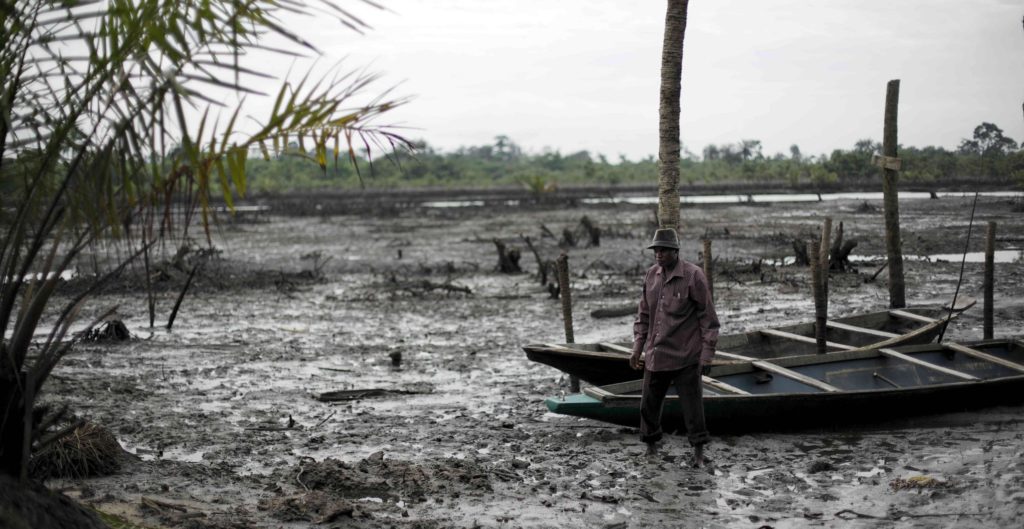
Chapter 8
October 2020. 25 years have passed since the unlawful death sentences of the Ogoni 9. Nigeria is the most densely populated country in Africa and the continent’s largest oil exporter. Oil makes up more than half of the government’s revenue. Yet 40% of the population lives in poverty. Shell’s oil extraction continues to cause spills in Ogoniland and other areas, which Shell is not cleaning up, such as last year in the Ikarama community in Bayelsa (https://guardian.ng/news/bayelsa-communities-vow-to-halt-spdcs- operations-over-oil-spill-damages/).
Large groups of young people and communities are rebelling against poverty, corruption and police violence in Nigeria. The army used firearms to crush the #EndSARS movement on October 20, killing more than 50 people.
Immediately militant groups in the Niger Delta declared their solidarity with #EndSARS and threatened to attack the oil infrastructure if the #EndSARS demands are not met. At the same time, the Bayelsa communities are announcing that they are ready to block Shell’s operations because of the oil spills on their land.
We demand that Shell takes responsibility for the pollution and complicity in the killings of the Ogoni 9. Shell must immediately clean up polluted areas in Nigeria and provide reparations and compensation to all victims of the oil extraction.
https://www.reuters.com/article/us-nigeria-economy-poverty-idUSKBN22G19A
R.I.P Barinem Kiobel
Chapter 9
In the middle of all this suffering and all these injustices, Shell continues business-as-usual, even starting new fossil fuel projects in Nigeria:
https://guardian.ng/business-services/shell-gas-to-boost-industrialisation-in-oyo/
Instead of addressing wrongdoings and taking responsibility, they invest in greenwashing and infiltration in our education and cultural institutions. Anything to keep their social license to operate. It’s time we started seeing Shell for what it really is: A company with no moral values, only driven by profit for shareholders. Shell will never be part of a just and sustainable future.
Therefore we say:
DISMANTLE SHELL by any legal, economic political means necessary
provide a JUST TRANSITION for the workers in the fossil industry
ensure REPARATIONS for impacted communities and ecosystems
build a decentralised and socialised ENERGY DEMOCRACY for all
The last words of Ken Saro-Wiwa: “Lord, take my soul, but the struggle continues.”
R.I.P Ken Saro-Wiwa
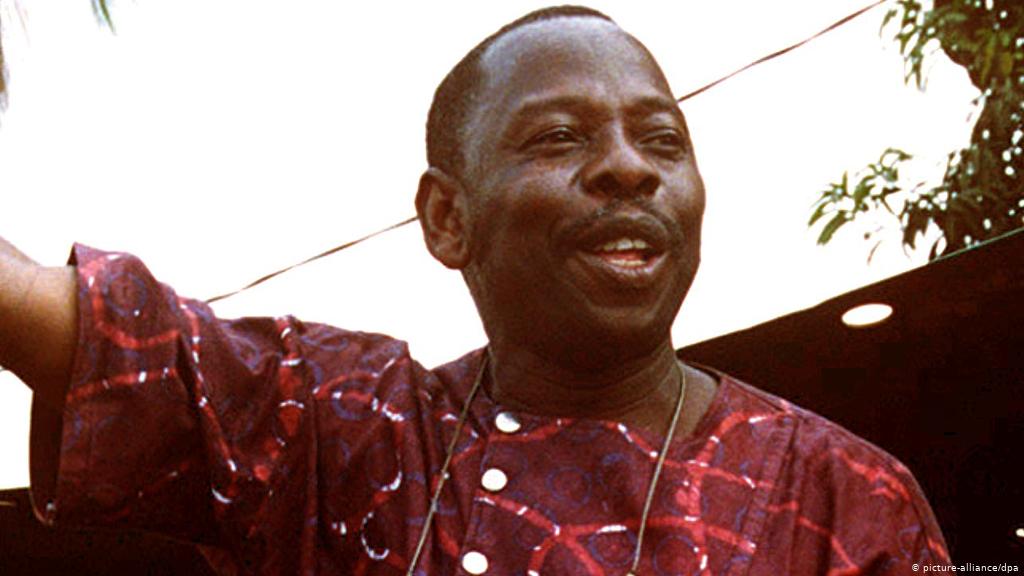
…

